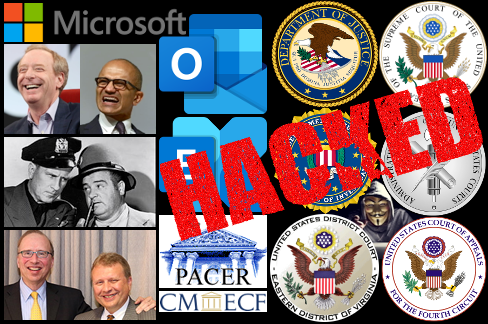
Hackers Own The Federal Legal System
By Duane Thresher, Ph.D. March 12, 2021
One of the most important implications of The Doomsday Microsoft Government Email Data Breach and Doomsday II: The Massive Microsoft Email Data Breach Sequel is that hackers "own" the U.S. federal legal system, which consists of the legal departments and agencies of the executive branch and the entire judicial branch of the federal government. These organizations all used Microsoft email in some way so had their networks of computers hacked into, permanently and undetectably. The very foundation of the legal system, and what is assumed by it, is that police evidence (usually documents) and court documents have not been tampered with, but hackers can now undetectably tamper with these documents at will since these documents are all digital (a.k.a. electronic) and on computers these days. All judicial decisions are now questionable (including in some of my own cases), as some enterprising defense lawyer will soon point out to his guilty client's advantage. It's far worse than even Equifax Dead: Hacked So Credit Reports Worthless. Additionally, many court documents contain sensitive information that could be used to hurt the people involved and is supposed to be kept confidential, and all this is now available to hackers. The only solution is to go back to paper only documents, mailing them, and physical security for them. This will not only make the legal process more secure, but more fair, as guaranteed by the Fifth Amendment right to due process.
Hackers "own" a computer or network of them when they can permanently and undetectably access them and do whatever they want, including accessing and undetectably tampering with any document. The hacker term "own" originally started as "pwn", but only because the first use of it was a typo (the "o" and the "p" are next to each other on the keyboard).
The Department of Justice (DOJ) was one of the many federal departments and agencies hacked in The Doomsday Microsoft Government Email Data Breach and Doomsday II: The Massive Microsoft Email Data Breach Sequel. The DOJ is the primary part of the executive branch in the federal legal system. It is run by the U.S. Attorney General, who until the (hacked?) 2020 presidential election was William Barr
 — see IT
Incompetent Attorneys General v. Google — but who on
March 11, 2021 became
Merrick Garland
— see IT
Incompetent Attorneys General v. Google — but who on
March 11, 2021 became
Merrick Garland
 , a judge from the U.S. Court of
Appeals for the District of Columbia Circuit. The Attorney
General acts federally much like a local district attorney,
deciding which cases to prosecute and writing those cases,
i.e. with court documents, like briefs, motions,
etc.
, a judge from the U.S. Court of
Appeals for the District of Columbia Circuit. The Attorney
General acts federally much like a local district attorney,
deciding which cases to prosecute and writing those cases,
i.e. with court documents, like briefs, motions,
etc.The hacked Department of Justice (DOJ) includes the Federal Bureau of Investigation (FBI), which acts federally much like local police, who work with the local district attorney and gather evidence for the cases. This evidence — usually documents, including forensic lab analyses — is gathered using a chain of custody to insure it hasn't been tampered with. My younger brother was a local cop for several years before becoming a special agent for U.S. Immigration and Customs Enforcement (ICE), which is an agency under the Department of Homeland Security (DHS). He spends quite a bit of time testifying in federal court.
With the DOJ and FBI hacked, permanently and undetectably, the evidence and court documents can be tampered with. Since it is just assumed that these documents have not been tampered with, tampering won't even be checked for. (Evidence tampering is after all a federal crime punishable by up to 20 years in prison; see Title 18 of U.S. Code, § 1519.) They'll simply accept the judges' decisions, based on these tampered documents.
The entire judicial branch of the federal government was hacked in The Doomsday Microsoft Government Email Data Breach and Doomsday II: The Massive Microsoft Email Data Breach Sequel. The judicial branch consists mainly of the U.S. District Courts, the U.S. Circuit Courts of Appeals, and the U.S. Supreme Court, in that order of use and increasing superiority. The structure and functioning of the judicial branch of the federal government is determined by Congress, and the Supreme Court is the only court explicitly specified in the U.S. Constitution: Article III Section 1 states, "The judicial Power of the United States, shall be vested in one supreme Court, and in such inferior Courts as the Congress may from time to time ordain and establish." (In the Supreme Court Case Selections Act of 1988, passed on a voice vote, Congress completely removed the right to appeal to the Supreme Court, so now the only court explicitly specified in the Constitution is no longer available to most people.)
As I know from experience, all federal courts warn that even if you mail in paper court documents, they will on receipt just be scanned, digitized, and put in the computer system. With the entire judicial branch of the federal government also hacked, permanently and undetectably, the evidence and court documents can be tampered with in a second place. And again, since it is just assumed that these documents have not been tampered with, tampering won't even be checked for. The judges will simply accept the tampered evidence and court documents and base their decisions on them, the decisions themselves being another document that can be tampered with.
The entire judicial branch of the federal government was hacked because the judicial branch's Administrative Office of the United States Courts (AO) was hacked and the AO handles all the judicial branch's documents, now all electronic. The AO is run by a committee that includes the Chief Justice of the U.S. Supreme Court, chief judges from each U.S. Circuit Court of Appeals, and chief judges from a U.S. District Court in each of these circuits.
That the Administrative Office of the United States Courts was hacked is not surprising, since they are also responsible for the Public Access to Court Electronic Records (PACER) system, which I mentioned in Stock Market Crash Deja Vu: Reddit Violates Securities Exchange Act had been hacked by Aaron Swartz
 in 2008. There is argument about
whether what Swartz did to PACER actually legally constitutes
hacking and in fact the FBI investigated and the DOJ finally
declined to prosecute. Swartz was able to download millions
of federal court documents using a library's credentials for
free access to PACER — anyone else had to pay 8 cents
per page (now 10 cents per page), which was (and is) very
profitable for the AO — and then made these documents
freely available to the public from anywhere. The reason
Swartz could download millions of documents is because PACER
was IT
incompetently programmed without a limit on how many
documents could be downloaded or a security alarm to alert the
AO that this suspicious activity was happening so they could
stop it.
in 2008. There is argument about
whether what Swartz did to PACER actually legally constitutes
hacking and in fact the FBI investigated and the DOJ finally
declined to prosecute. Swartz was able to download millions
of federal court documents using a library's credentials for
free access to PACER — anyone else had to pay 8 cents
per page (now 10 cents per page), which was (and is) very
profitable for the AO — and then made these documents
freely available to the public from anywhere. The reason
Swartz could download millions of documents is because PACER
was IT
incompetently programmed without a limit on how many
documents could be downloaded or a security alarm to alert the
AO that this suspicious activity was happening so they could
stop it.That PACER is IT incompetently programmed is obvious to the IT competent who have used it, as I have. PACER was started in 1988 (the same year Congress took away all rights to appeal to the Supreme Court), before the existence of the World Wide Web (www.), where PACER is now, and when most people were still using telephones (landlines) and modems to connect to remote computer systems. The PACER interface is clumsy and awkward, and even more so than would be expected from being programmed in 1988; the PACER project was not done by expert programmers, just hobbyists.
The IT incompetent would argue that PACER — Public Access to Court Electronic Records — is only, as the name implies, for read-only public access, so court documents can not even be uploaded by just anyone, never mind tampered with. This uploading is done using the Case Management/Electronic Case Files (CM/ECF) system and only by lawyers and judges registered to use the system. However, CM/ECF was started about the same time PACER was, and created by similar people, so is just as IT incompetently programmed, and PACER is just an interface to CM/ECF. With the Microsoft email data breaches, both CM/ECF and PACER have been hacked, permanently and undetectably.
Tampering with evidence and court documents to affect legal decisions is not the only danger. When Aaron Swartz made millions of federal court documents from PACER freely available to the public in 2008, it was noted that these documents were full of sensitive information that could be used to hurt the people involved and was supposed to be kept confidential, like social security and tax ID numbers, birthdates, financial account numbers, medical records, names of minors, home addresses, etc. A year or so before this, the federal courts had shifted the responsibility of keeping this sensitive information confidential from themselves to the litigants (filers), via required redaction by the litigants; see for example Rule 49.1 of the Federal Rules of Criminal Procedure. The federal courts do have provisions for sealed and confidential files — see the Sealed & Confidential Materials notification from my U.S. Fourth Circuit Court of Appeals case — but with CM/ECF hacked, these provisions are just as worthless at protecting sensitive information.
I already have suspicious activity with the filing of my appeal with the U.S. Fourth Circuit Court of Appeals (case 21-1118, available on PACER), which started out in Eastern District of Virginia U.S. District Court (case 3:20cv307, available on PACER), although this is probably due to the corrupt and/or incompetent U.S. District Court judge, David Novak
 (see my
appeal). Incredibly, when you pay the $500 filing fee for
a U.S. Appeals Court case (oddly, $400 for a U.S. District
Court case and $300 for a U.S. Supreme Court case), you pay it
to the U.S. District Court of the judge whose decision, and
integrity, you are questioning with your appeal and whose
career you are hurting with it, i.e. the U.S. District Court
judge has a strong motive to make it difficult for you to file
the appeal. In my case, the suspicious activity is Judge
Novak saying I never sent the U.S. District Court the filing
fee check, only a copy of it. I did actually send them the
actual check and can easily prove that (I'm in the process of
doing so), which would show that the U.S. District Court has
been hacked or Judge Novak is lying.
(see my
appeal). Incredibly, when you pay the $500 filing fee for
a U.S. Appeals Court case (oddly, $400 for a U.S. District
Court case and $300 for a U.S. Supreme Court case), you pay it
to the U.S. District Court of the judge whose decision, and
integrity, you are questioning with your appeal and whose
career you are hurting with it, i.e. the U.S. District Court
judge has a strong motive to make it difficult for you to file
the appeal. In my case, the suspicious activity is Judge
Novak saying I never sent the U.S. District Court the filing
fee check, only a copy of it. I did actually send them the
actual check and can easily prove that (I'm in the process of
doing so), which would show that the U.S. District Court has
been hacked or Judge Novak is lying.The only solution to all this is to go back to paper documents, mailing them, and physical security for them. And not just as an optional alternative to electronic filing, but as the required and only way to file. This is necessary because in a court case, there are two opposing sides filing and they can file sensitive information about the opposition, if just to hurt them.
The judicial branch of the federal government has just in January 2021, in response to The Doomsday Microsoft Government Email Data Breach, come to its senses — sort of — and adopted Standing Order 21-01, which requires "the filing of highly sensitive sealed documents in paper form", which "will not be uploaded to CM/ECF". The first caveat is that it's only for "highly sensitive sealed documents", which are rather rare. The second caveat is that there is still an option of filing "via a secure electronic device", which the federal government obviously can't provide and which is also just flat out admitting that CM/ECF has been hacked.
Using only paper documents by mail will not slow the legal process down either, only make it more fair, as guaranteed by the Fifth Amendment right to due process. Pro se litigants like myself are barred from using the CM/ECF system to electronic file themselves; they must send in paper documents by mail. Lawyers and judges though use CM/ECF. The lawyers typically drag out the cases as long as possible to hurt their opponents and with electronic filing can wait until 5 PM on the day of the deadline to file, as they did in my U.S. District Court case 3:20cv307. The judges essentially have no deadlines and drag out cases for months or years longer than necessary to hurt whichever side they dislike — and they hate pro se litigants — which Judge Novak did in my U.S. District Court case 3:20cv307. Technically, the Sixth Amendment guarantees the right to a speedy trial, but only explicitly in criminal cases, and defendants are often coerced into giving up this right. Even after 230 years, it's not clear whether the Sixth Amendment applies to civil cases, and this is one of the issues in my appeal.
Since it's not going to slow the legal process down anyway, all parties should use the U.S. mail, which is more secure than electronic filing, even while it has become unreliably slow, particularly lately. For example, to make my 23 Dec 2020 appeal filing deadline — Judge Novak delayed his decision so I would have to write my appeal during the holidays — I sent my appeal in using USPS Priority Mail Express, which is guaranteed next day delivery or your money back ($26.35 then). As the tracking shows, USPS did not even attempt to deliver it the next day. And then USPS even refused to give my money back. As another example, I sent the same documents in the same USPS Priority Mail envelopes to the same city — Richmond, Virginia, where the Eastern District of Virginia U.S. District Court and the U.S. Fourth Circuit Court of Appeals are only blocks apart — from the same post office at the same time, and as the District Court tracking and Appeals Court tracking shows, the former arrived two days after the latter, having spent the extra time in Maryland, in the opposite direction from Richmond.
What about public access like PACER to paper court documents? I'm all for public access to government files. As I wrote in FOIA: That's Some Exemption, That Exemption 6, I file a lot of Freedom Of Information Act (FOIA) requests; it's the only way to find out what the federal government is really doing. And I, like the framers of the Constitution, fear secret court proceedings, such as the rubber stamp ones used by the NSA to get warrants to read Americans' email. However, knowing a case is going on in what court and being able to read the judge's decision — someone who knows what sensitive information to redact — should be enough. Many of those involved in cases are not government officials (or even government contractors, who should be subject to FOIA but are not) so should not be subject to FOIA.
Many of my FOIA requests are denied by the federal government or take years. I guess if I want to find out what the federal government is doing, I should just ask the hackers who own federal government IT.
